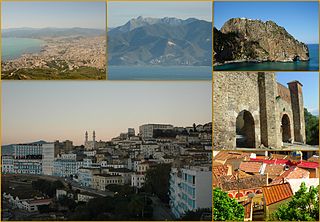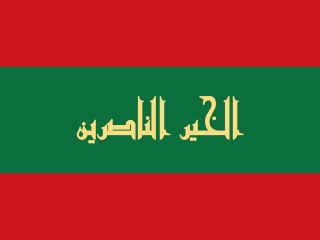
Béjaïa formerly Bougie and Bugia, is a Mediterranean port city and commune on the Gulf of Béjaïa in Algeria; it is the capital of Béjaïa Province.

Sheikh Mohamed El-Mokrani, also known as Mohand Amokrane, was one of the principal leaders and the namesake of the Mokrani Revolt of 1871 against the French occupation of Algeria.

The French conquest of Algeria took place between 1830 and 1903. In 1827, an argument between Hussein Dey, the ruler of the Regency of Algiers, and the French consul escalated into a blockade, following which the July Monarchy of France invaded and quickly seized Algiers in 1830, and seized other coastal communities. Amid internal political strife in France, decisions were repeatedly taken to retain control of the territory, and additional military forces were brought in over the following years to quell resistance in the interior of the country.

The Kingdom of Beni Abbas or Sultanate of Beni Abbas was a state in North Africa, then a fief and a principality, controlling Lesser Kabylie and its surroundings from the sixteenth century to the nineteenth century. It is referred to in the Spanish historiography as "reino de Labes"; sometimes more commonly referred to by its ruling family, the Mokrani dynasty. Its capital was the Kalâa of Ait Abbas, an impregnable citadel in the Biban mountain range.

The Palestro ambush, or Djerrah ambush, took place on 18 May 1956, during the Algerian War, near the village of Djerrah in the region of Palestro in Kabylie. A section of about forty men from the National Liberation Army (ALN) under the command of Lieutenant Ali Khodja ambushed a unit of 21 men from the 9th Colonial Infantry Regiment of the French Army commanded by Second Lieutenant Hervé Artur.

Auguste Hubert Warnier was a French medical doctor, journalist and politician who spent most of his career in Algeria. At first he was a Saint-Simonian and was sympathetic to the local population. He thought the Berbers had Germanic blood and a civilization derived from Roman and Christian origins, so could readily adapt to French civilization. He had no respect for the Arab "intruders". Later he took the view that the indigenous people had destroyed the once-fertile environment of Algeria, became a proponent of French colonization and opposed the "Arab Kingdom" policy of Napoleon III. In his last years he was a Representative in the National Assembly for the Province of Algiers. He was responsible for a law that allowed expropriation of land or forced sale to colonists.

The Mokrani Revolt was the most important local uprising against France in Algeria since the conquest in 1830. }}
In March 1871 Cheikh Mokrani revolted against the French, providing sole leadership of the rising and joined by Bordj-Bou-Arréridj. The latter was assisted by his brother Boumezrag and his cousin El Hadj Bouzid; plus Sheikh Mohand Meziane Ahaddad of Saddouk Oufella, a great scholar theologian of the Zaouia Tarahmanit who joined this uprising with his tribe. Using his position and influence on the Rahmania brotherhood Sheikh Mohand-Amokrane was able to overcome dissension in the rebel camp and retake Bordj-Bou-Arreridj.
The Battle of Alma or Battle of Boudouaou, which broke out on 19 April 1871, was a battle of the Mokrani Revolt by Algerian rebels against France, which had been the colonial power in the region since 1830.
Alexandre Édouard Constant Fourchault was a French officer.

The Battle of the Col des Beni Aïcha or Battle of Thenia, which broke out on 19 April 1871, was a battle of the Mokrani Revolt between the Algerian rebels, and the France, which was the colonial power in the region since 1830.
Orphis Léon Lallemand was a French officer.

The Algerian popular resistance against French invasion refers to resistance in Algeria against the French conquest, which began with the invasion of Algiers in 1830 and lasted until 1903.
Cheikh Mohamed El-Boumerdassi was one of the principal leaders of the popular Mokrani Revolt uprising of 1871 against the French occupation of Algeria.

The Expedition of the Col des Beni Aïcha in May 1837, during the French conquest of Algeria, pitted the troupes coloniales under Colonel Maximilien Joseph Schauenburg against the troops of Beni Aïcha of the Igawawen.

The First Battle of Boudouaou in 25–26 May 1837, during the French conquest of Algeria, pitted the troupes coloniales under Colonel Maximilien Joseph Schauenburg against the troops of Kabylia of the Igawawen.
Zawiyet Sidi Amar Cherif, or Zawiyet Sidi Daoud, is a zawiya school located in Boumerdès Province in Algeria.

The First Battle of the Issers in May 1837, during the French conquest of Algeria, pitted the troupes coloniales under General Perrégaux and Colonel Schauenburg against the troops of Kabylia of the Igawawen.

The Battle of the Col des Beni Aïcha (1846) or Battle of Thénia (1846), which broke out on 3 February 1846, was a battle of the French conquest of Algeria between the Algerian rebels, and the France, which was the colonial power in the region since 1830.

The Beylik of Constantine, Beylik of the Sunrise or Beylik of the East as was its official designation, was one of the three Beyliks of the Regency of Algiers . The region liberated itself from the Hafsid Emirate of Béjaïa in the early 16th century, and constituted itself around Constantine in the mid to late 16th century. The Beylik collapsed in the 1837 siege of Constantine during the French conquest of Algeria. The Constantine department was formed upon the bases of the Beylik in 1848.
Omar ben Zamoum was a Kabyle marabout who participated to the Algerian resistance during Mokrani Revolt against the French conquest of Algeria.










